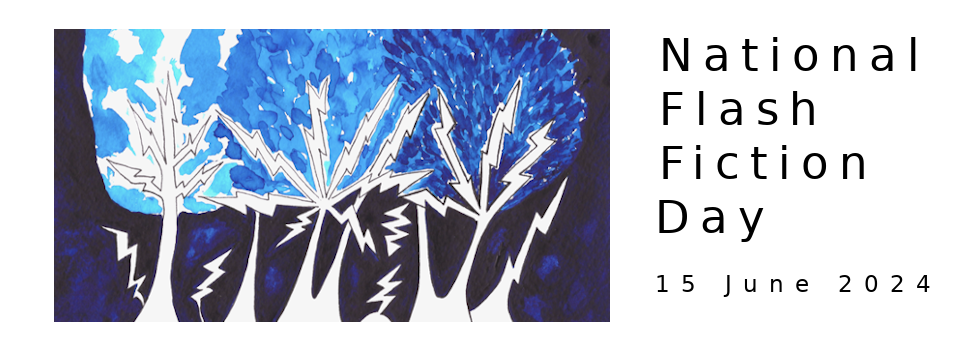Welcome to the second in our series of interviews with this year's National Flash Fiction Day Anthology editors and Microfiction Competition judges! Submissions for the Anthology and Microfiction Competition are open until 15 February 2023.
This week, Diane Simmons chats with Fiona J. Mackintosh, one of this year's Microfiction Competition judges, about everything from flash to novels to collections, as well as her advice for writers entering this year's competition....
 DS: You won the National Flash Fiction Day Micro Fiction Competition in 2018 with The Birth of The Baptist and have had considerable success in other flash competitions. Do you have any advice for writers entering the micro fiction competition?
DS: You won the National Flash Fiction Day Micro Fiction Competition in 2018 with The Birth of The Baptist and have had considerable success in other flash competitions. Do you have any advice for writers entering the micro fiction competition?
FJM: I find writing microfiction hard to be honest. I’m very committed to telling stories with a beginning, middle, and end (though not necessarily in that order of course) and that’s insanely hard to do in 100 words or less. I take my hat off to anyone who even attempts it, and the best examples are little miracles. The Birth of the Baptist was originally a tiny fragment of a longer story about a young couple travelling around Italy, but I came to realise that this one little paragraph encapsulated a whole arc of knowing you’re going to lose love even while you still have it. So basically, the piece was a fluke! Having said that, I do know a great micro when I see one, and I’m very much looking forward to reading the entries for 2023.
DS: You are a Scottish-American writer living in America. I wondered if you write in a different style depending on which country the story is set in.
FJM: To some extent I do, yes. The main difference is in the cadence of the characters’ speech and their internal monologues. It can take a while to get into the swing of it, but once I get it, I find that even my own thoughts tend to be in that character’s rhythm and vernacular. Though once the story’s written, I always try to get a second opinion from a beta reader because sometimes a Brit expression creeps into an American story and vice versa. And then there’s English versus Scottish characters. Recently, I’ve been writing a lot of stuff set in Scotland, which is why I have to keep going back there to make sure I’m getting the voices right. At least that’s my excuse!
DS: Your flash collection The Yet Unknowing World was published by Ad Hoc Fiction in 2021. Did you enjoy the process of putting together a collection and do you have any advice for anyone considering doing one themselves?
FJM: I loved it! Ad Hoc Fiction is a fabulous publisher and gave me plenty of leeway and support. I’d hit on the idea of New World (stories set in the US) and Old World (stories set in Europe and the rest of the globe) early on, but within those two categories, getting the flashes in the most readable order was a bit of a struggle. I enlisted the help of some trusted friends, including Jeanette Sheppard, whose moving flash collection Seventy Percent Water won the EllipsisZine Flash Fiction Collection Competition, and Keith Donohue, the author of several excellent novels including the international bestseller The Stolen Child. On their advice, I tried to vary the length and style of the stories as well as the tone, though tone was tricky as I tend to write a lot of depressing stories – odd because I’m quite a cheerful person in real life! Keith also suggested varying the order by first, second, and third person, which hadn’t occurred to me but made a lot of sense. I’m pretty happy with how the order turned out.
That being said, I’m not sure that most people read flash collections from start to finish like they would a novella-in-flash. It can be more rewarding to read them one at a time and let each one settle into your consciousness before moving on to the next – much like reading a book of poetry. Otherwise, the stories can tend to blur into each other in the reader’s mind. The bottom line is the quality and resonance of the individual stories are what matters most.
DS: I know that as well as a being a flash fiction writer, you are a novelist. I wondered if being a flash fiction writer has influenced your novel writing and whether you find it difficult to switch between the two forms?
FJM: Flash has absolutely improved my writing style in general and has had a very positive knock-on effect on my novel writing, or so I believe. In fact, after I began learning the lessons of flash writing, I rewrote much of the language in my historical novel Ancestral Virgins. It took me a long time, but I believe it’s a much better book for the effort.
I tend to jump around from project to project like a bloody grasshopper – current novel, other current novel, short stories, flashes – and in principle I have no trouble switching between them. But when my day job is particularly intense, flash is the only writing I can do in the ten-minute intervals available to me, and it’s a godsend for keeping me sane.
DS: Did you have a favourite novel as a child? If so, do you ever go back and re-read it?
FJM: Sooo many. Since I was horse mad, most of my faves involved quadrupeds. I reread National Velvet as an adult and was surprised to find how good it was. Black Beauty was much too sad for me, but it does make a cameo appearance in my historical novel, Ancestral Virgins. Other faves were Little Women, the What Katy Did series, The Borrowers, the Narnia books, The Secret Garden, and Tom’s Midnight Garden to name but a few. I only wish I had as much time now to read for pleasure as I did then!
Fiona J. Mackintosh (www.fionajmackintosh.com) is the Scottish-American author of a flash collection, The Yet Unknowing World published in the UK by Ad Hoc Fiction. She has won the Fish, Bath, Reflex, Flash 500, and NFFD Micro competitions, and her short stories have been listed in several competitions in the UK and Ireland. She lives just outside Washington D.C., and her historical novel Ancestral Virgins is currently on submission to agents.
